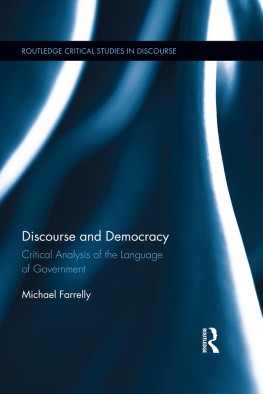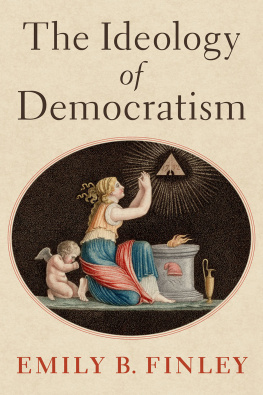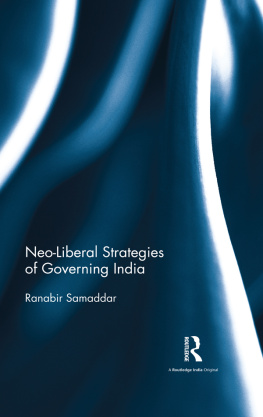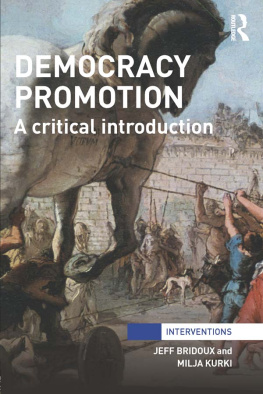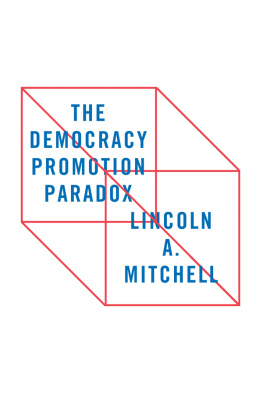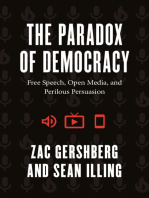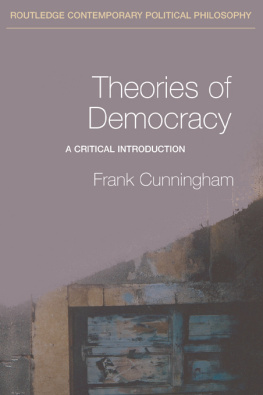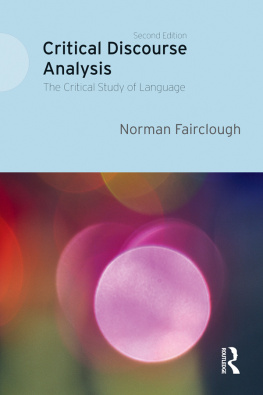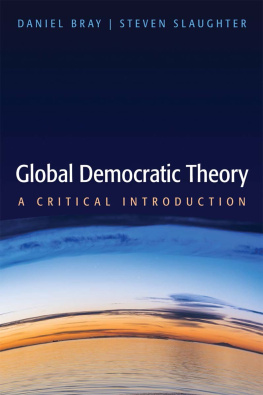1.1 Democracy in the Language of Government
A great paradox of contemporary democracy in the English-speaking world is this: the very language of democracy, as employed by some in positions of influence, insulates governments from the effects of democracy. Statesmen and stateswomen of our time brandish the words of democracy with alacrity; yet their actions steadily close-off issues of collective concern from public policy, close-off public policy from political responsibility, and close-off both, therefore, from democratic influence.
A contemporary example is the response to the North-Atlantic financial crisis in the United Kingdom. As the crisis became increasingly visible from 2007 onward, there was widespread media condemnation of huge fat-cat salaries and bonus payments to bankers and apparent public anger at such high remuneration at a time in which the banking sector was so closely implicated in the crisis. In addition to the anger over excessive remuneration, the predominance which the financial sector had in the UK economy was, albeit less vocally, questioned, and calls to re-balance toward manufacturing were also made. The issues of bonuses, salaries, and the governance of this sector had become an issue of collective concern for the British people because their government had bailed-out the banking sector with public funds. There was a demand put on government to regulate this sector which was widely seen as having become a liability to the national political economy. Yet the actions of government did not meet this demand. Instead they left the issues of salary and bonus to the discretion of finance companies; they failed to regulate the activities of the sector. The liabilities of the private banking sector were to become absorbed, via cuts in public spending, by the people of the United Kingdom. Excuses for this course of action in the face of calls to act otherwise were that banks were too big to fail, that salaries were not a matter of public policy, that in a globalised world London-based financial companies needed to reward employees lavishly in order to remain competitive. The specific issues of collective concern in this example, as with so many issues of collective concern, were deemed by government in the last instance to be beyond public policy, beyond political responsibility, and therefore beyondas far as those in government appear to have been concernedthe influence of democracy.
Yet, in the public-political realm of the liberal state, the language of democracy is pervasive. State leaders of our time repeat again and again words which suggest that government is the champion of democracy. Whereas so much that is of collective, practical concern is put beyond the reach of democracy by the actions of governments, political leaders make great, often idealistic, often vague promises concerning democracy. So it is that in 2005 the president of the United States of America, George W. Bush, could say to the audience of his second inaugural address that it is the policy of the United States to seek and support the growth of democratic movements and institutions in every nation and culture, with the ultimate goal of ending tyranny in our world (Bush, 2005). So it is that in the same year across the Atlantic Ocean the election manifesto of the incumbent and winning Labour Party could hold that with Labour, a strong Britain will force international terrorism into retreat and help spread democracy and freedom around the world (Labour Party, 2005: 91)that in the Southern Hemisphere the prime minister of Australia could say, We support countries making the often difficult journey to democracy, conscious that they will choose the path that fits with their history and culture (Howard, 2005). The words of all three suggest that their respective nation states, under the direction of the governments they lead, are champions of democracy.
How fit, though, are they to think of themselves as champions of democracy when, as Colin Hay notes, despite its near global diffusion, democracy motivates a seemingly ever smaller proportion of the electorate to exercise its right to vote in the states in which that right has existed longest (Hay, 2007: 1). If the will to enact democracy is on the wane in these nations, then they are surely poor champions. These leaders speak in terms of spreading democracy, yet what they think of as democracyelectorates holding and exercising a right to vote for candidates in competition to hold a particular type of position within a particular system of governmentseems to be faltering within their own states. The championing of democracy by the leaders of liberal states is the first piece in a puzzle which makes for a paradox in contemporary democracy.
This paradox has real consequences. In the words of the leaders of liberal states, diverse connections with democracy are worked-up, workings which lend a veneer of legitimacy to political decisions and to the reproduction or transformation of social orders that can be, and all too often are, empty of moral justification. One morally questionable issue of collective concern is the systemic amassing of material wealth in one part of the social order whilst other parts of the social order are left materially impoverished. Leaders of liberal states consistently work-up a connection between democracy, prosperity, and wealth. Yet they do so in a way which leaves out the asymmetry in the system of wealth distribution that we currently endure. In the inaugural presidential speech quoted above, American prosperity is connected to self-government:
By making every citizen an agent of his or her own destiny, we will give our fellow Americans greater freedom from want and fear, and make our society more prosperous and just and equal. In Americas ideal of freedom, the public interest depends on private characteron integrity, and tolerance toward others, and the rule of conscience in our own lives. Self-government relies, in the end, on the governing of the self.
(Bush, 2005)
In a later speech to the World Economic Forum held in Egypt, the same president spoke words which connected transitions to democracy in nations around the world to the reduction of poverty for their people:
This hopeful movement made its way to places where dictators once reigned and peaceful democracies seemed unimaginable: places like Chile and Indonesia and Poland and the Philippines and South Korea. These nations have different histories and different traditions. Yet each made the same democratic transition, and they did it on their own terms. In these countries, millions every year are rising from poverty.
(Bush, 2008)
In the United Kingdom, the words of the Labour Partys election manifesto connected international principles of democracy to British prosperity: The UN Charter proclaims the universal principles of human rights and democracy. In an uncertain world they are not only right in principle, they are important guarantees of our national security and prosperity too (Labour Party, 2005: 85). The prime minister of Australias speech set its championing of democracy in terms of world prosperity:
Australia has a proud history of supporting political and economic freedom. We believe that these freedoms produce a more stable and pros perous Australia, and that they also produce a more stable and prosperous world. We support freer trade and investment for the material benefit this can bring to ourselves and to others. We support countries making the often difficult journey to democracy.
(Howard, 2005)
Yet these notions of a more prosperous society, national prosperity, and a prosperous world leave aside any thought of how the wealth which makes for prosperity is distributed within societies, within nations, and across the world. In 2006 the United Nations released a report which showed that the distribution of our wealth is massively uneven. It told that 40% of the wealth in the world was held by just 1% of the global population; that the poorest half of humanity shared only 1% of our wealth between them; and that the global distribution of income is very unequal and the inequality has not been falling over time. In some regions poverty and income inequality have become much worse (Davies et al., 2006: 2). Certainly, the report showed that a great deal of wealth was held in nations which count themselves as democratic, but it also showed the following: The US is the richest country, with mean wealth estimated at $144,000 per person in the year 2000. At the opposite extreme among countries with wealth data, we have India with per capita wealth of about $6,500 in purchasing power parity terms (Davies et al., 2006: 3). The democracy championed by the leaders of liberal states does not then, as the words which these state leaders use suggest, bring prosperity. Nor do the words of democracy that they use address the more pressing moral issue of the vast and unchanging disparity in wealth across humanity. Even more challenging to the leaders of liberal states propounding a connection between democracy and prosperity is that within those nations the distribution of wealth is also vastly uneven. In America, a UN working paper found: In recent decades, income disparity in the United States of America has increased. Employee compensation as a share of national income has tended to decline, the profit share of national income has grown, and inequality within labour has risen (Boushey and Weller, 2006: 1). In the United Kingdom, the Office for National Statistics told: The wealthiest 1 per cent owned approximately a fifth of the UKs marketable wealth in 2003. In contrast, half the population shared only 7 per cent of total wealth (ONS, 2006). In Australia, the Bureau of Statistics reported:

